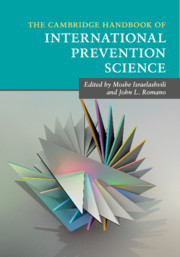Book contents
- The Cambridge Handbook of International Prevention Science
- The Cambridge Handbook of International Prevention Science
- Copyright page
- Dedication
- Contents
- Figures
- Tables
- Contributors
- Foreword
- Acknowledgments
- The Nature of Prevention Science
- Part I The Essence of Prevention Science
- Foundations
- Methodology
- Implementation
- Expansion
- 19 Targeting Anxiety Sensitivity to Prevent the Development of Psychopathology
- 20 Prevention in the Context of Cross-Cultural Neuroscience
- 21 Prevention of Disaster Impact and Outcome Cascades
- 22 Forgiveness Interventions and the Prevention of Poor Health, Hostile Relationships, and Societal Hatred and Violence
- Part II The Globalization of Prevention Science
- Index
- References
22 - Forgiveness Interventions and the Prevention of Poor Health, Hostile Relationships, and Societal Hatred and Violence
from Expansion
Published online by Cambridge University Press: 21 January 2017
- The Cambridge Handbook of International Prevention Science
- The Cambridge Handbook of International Prevention Science
- Copyright page
- Dedication
- Contents
- Figures
- Tables
- Contributors
- Foreword
- Acknowledgments
- The Nature of Prevention Science
- Part I The Essence of Prevention Science
- Foundations
- Methodology
- Implementation
- Expansion
- 19 Targeting Anxiety Sensitivity to Prevent the Development of Psychopathology
- 20 Prevention in the Context of Cross-Cultural Neuroscience
- 21 Prevention of Disaster Impact and Outcome Cascades
- 22 Forgiveness Interventions and the Prevention of Poor Health, Hostile Relationships, and Societal Hatred and Violence
- Part II The Globalization of Prevention Science
- Index
- References
- Type
- Chapter
- Information
- The Cambridge Handbook of International Prevention Science , pp. 520 - 548Publisher: Cambridge University PressPrint publication year: 2016
References
- 1
- Cited by



